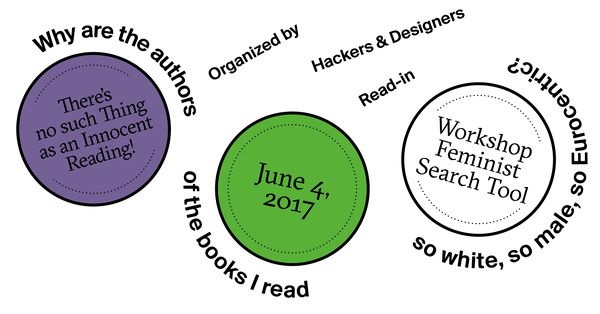Workshop Feminist Search Tool UU Libary: Difference between revisions
No edit summary |
No edit summary |
||
| Line 8: | Line 8: | ||
|Print=No | |Print=No | ||
}} | }} | ||
[[File: | [[File:Read-in-FB-Banner-different format3.jpg|600px]] | ||
In collaboration with Utrecht-based art & research collective [[Read-in]] Hackers & Designers developed the Feminist Search Tool*,–a digital interface that invites users to explore different ways of engaging with the records of the Utrecht University Library, putting forth the question: Why are the authors of the books I read so white, so male, so Eurocentric?. It has been developed by Read-in in collaboration with James Bryan Graves & Anja Groten in the context of the project Unlearning My Library. Bookshelf Research and functions as an awareness-raising tool to stir conversations about the inclusion and exclusion mechanisms that are inherent to our current Western knowledge economy. To this end, the Feminist Search Tool invites us all to reflect about our own search inquiries, and how the latter may be directed by our own biases and omissions. More broadly, it raises the question about the different decisions taken that influence our searches: Who is taking responsibility for which part of the search process: we, the users, the researcher, the library, the algorithm, ect.? And how does this influence our search result? | In collaboration with Utrecht-based art & research collective [[Read-in]] Hackers & Designers developed the Feminist Search Tool*,–a digital interface that invites users to explore different ways of engaging with the records of the Utrecht University Library, putting forth the question: Why are the authors of the books I read so white, so male, so Eurocentric?. It has been developed by Read-in in collaboration with James Bryan Graves & Anja Groten in the context of the project Unlearning My Library. Bookshelf Research and functions as an awareness-raising tool to stir conversations about the inclusion and exclusion mechanisms that are inherent to our current Western knowledge economy. To this end, the Feminist Search Tool invites us all to reflect about our own search inquiries, and how the latter may be directed by our own biases and omissions. More broadly, it raises the question about the different decisions taken that influence our searches: Who is taking responsibility for which part of the search process: we, the users, the researcher, the library, the algorithm, ect.? And how does this influence our search result? | ||
Revision as of 14:42, 25 May 2017
| Workshop Feminist Search Tool UU Libary | |
|---|---|
| Name | Feminist Search Tool |
| Location | University of Utrecht |
| Date | 2017/06/04 |
| Time | [[]] |
| PeopleOrganisations | Read-in, Hackers & Designers |
| Type | Meetup |
| Web | Yes |
| No | |
In collaboration with Utrecht-based art & research collective Read-in Hackers & Designers developed the Feminist Search Tool*,–a digital interface that invites users to explore different ways of engaging with the records of the Utrecht University Library, putting forth the question: Why are the authors of the books I read so white, so male, so Eurocentric?. It has been developed by Read-in in collaboration with James Bryan Graves & Anja Groten in the context of the project Unlearning My Library. Bookshelf Research and functions as an awareness-raising tool to stir conversations about the inclusion and exclusion mechanisms that are inherent to our current Western knowledge economy. To this end, the Feminist Search Tool invites us all to reflect about our own search inquiries, and how the latter may be directed by our own biases and omissions. More broadly, it raises the question about the different decisions taken that influence our searches: Who is taking responsibility for which part of the search process: we, the users, the researcher, the library, the algorithm, ect.? And how does this influence our search result?
